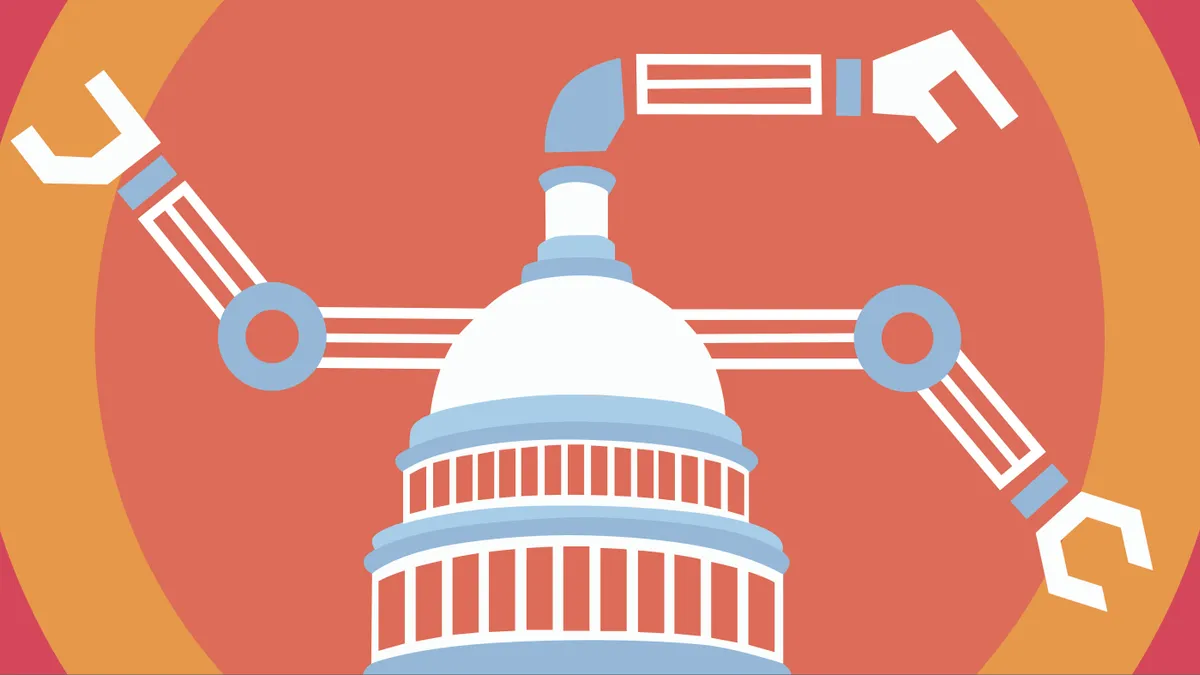Editor's Note: The following is a weekly column covering technology and regulation within the supply chain and logistics industries.
Infrastructure Week and gas tax talk
It's Infrastructure Week, but the freight industries and Congress are still trying to find common ground. The House Appropriations Committee just released its Fiscal Year 2019 Transportation, Housing and Urban Development Funding bill that sets aside $250 million for port projects, but ports say they need at least $20 billion just for rail and multimodal projects.
Rep. Peter DeFazio, D-Ore., told Bloomberg Government if the Democrats take back the house, he wants to implement a gas tax to raise funding for infrastructure. The American Trucking Associations (ATA) previously advocated for a gas tax, but a spokesperson at the Chamber of Commerce told Supply Chain Dive it's unlikely the greater business community will support such a measure that's so unpopular with voters.
The Reaction: Speculation on the likelihood of a gas tax is difficult, but the running theme of the week is still the private sector wanting more funds than the federal government is willing to give.
Because maintaining the nation's infrastructure is a Constitutional mandate, Congress should have an interest in accommodation — but given the federal deficit and other high priority budget items, the modes of freight probably aren't going to get all the funding they want.
Apple thinks tariffs are a bad idea
Apple CEO Tim Cook thinks a trade war with China is a bad idea, and apparently he told President Trump, according to Bloomberg. Cook considers open trade to be more of a boon to the U.S. economy than Trump's protectionist measures.
The Reaction: Cook's opinion as the head of a global company is unsurprising. Apple's supply chain is vast and globally complex, and relies on Chinese industry to operate at its current levels. Cook's primary interest is in preserving his supply chain exactly the way it is.
Unfortunately, the way things are going, even big companies such as Apple may need to review their resiliency plans and rearrange components of their supply chains to adjust to the current geopolitical climate.
Is it just us, or did a lot of people join BiTA this week?
The Blockchain in Transport Alliance — whose members includes 3PLs like UPS and FedEx — received an influx of new members this week, including FreightOptics (a freight auditing and optimization software company), supply chain solutions provider Roadrunner Transportation Systems and Consolidated Chassis Management (CCM), according to multiple reports from FreightWaves.
The Reaction: Companies along the supply chain may not have clearly defined blockchain implementation plans in place, but more companies in transportation are jumping on the blockchain bandwagon.
If enough members of the supply chain join one alliance to create a healthy mix of carriers, 3PLs and other solutions providers, they might be able to agree on using one blockchain solution to span much of supply chain freight. That could distill data-sharing problems and privacy concerns, and could ease implementation for various industries exploring the tech, such as biopharma.
In case you missed it
Intel is testing autonomous vehicles (AVs) in Jerusalem, and Reuters reported the tech company just closed a deal to supply 8 million AVs to an undisclosed European automaker.
DP World and Virgin Hyperloop One announced they're interested in developing a hyerloop for cargo transit, FreightWaves reported (but given the current infrastructure debate in the U.S., who knows when this would happen). FedEx is already testing blockchain as a way to track cargo.
Tesla registered a company in Shanghai, The Wall Street Journal reported, which means we may see a Tesla factory overseas soon.
In other news, the Loadstar reported that technology adoption in air freight moves slower than molasses.
Looking ahead
The Northeast Corridor won $650 million from the House Appropriations Committee's transportation bill to "repair and modernize" the railway. While some in the industry are frustrated by the lack of funding, others like the Northeast Corridor are finally getting what they need.
United States Trade Representative Robert Lighthizer originally said he hoped for a NAFTA deal by mid-May, but now it looks like we may not see a deal at all this year.














